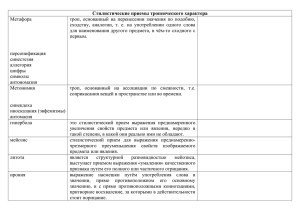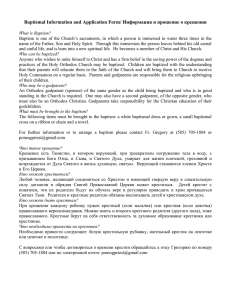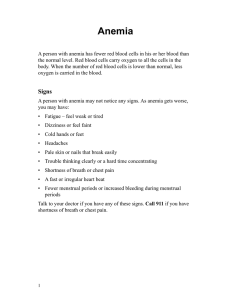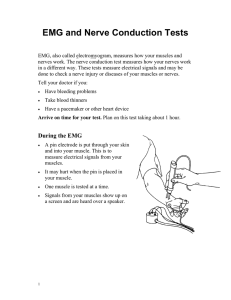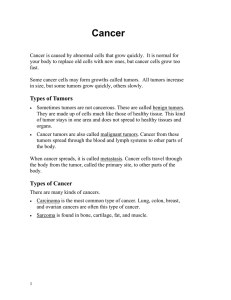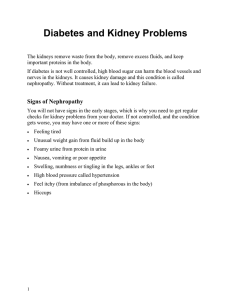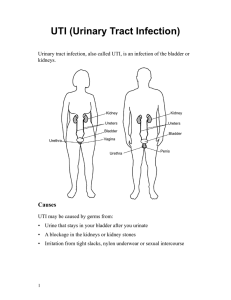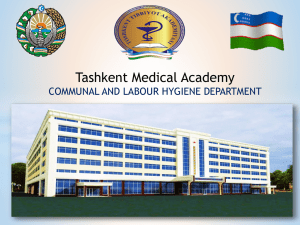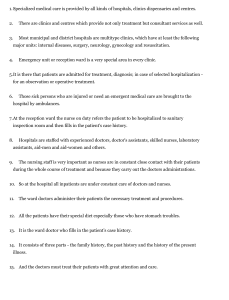4 курс THE HOSPITAL II
реклама
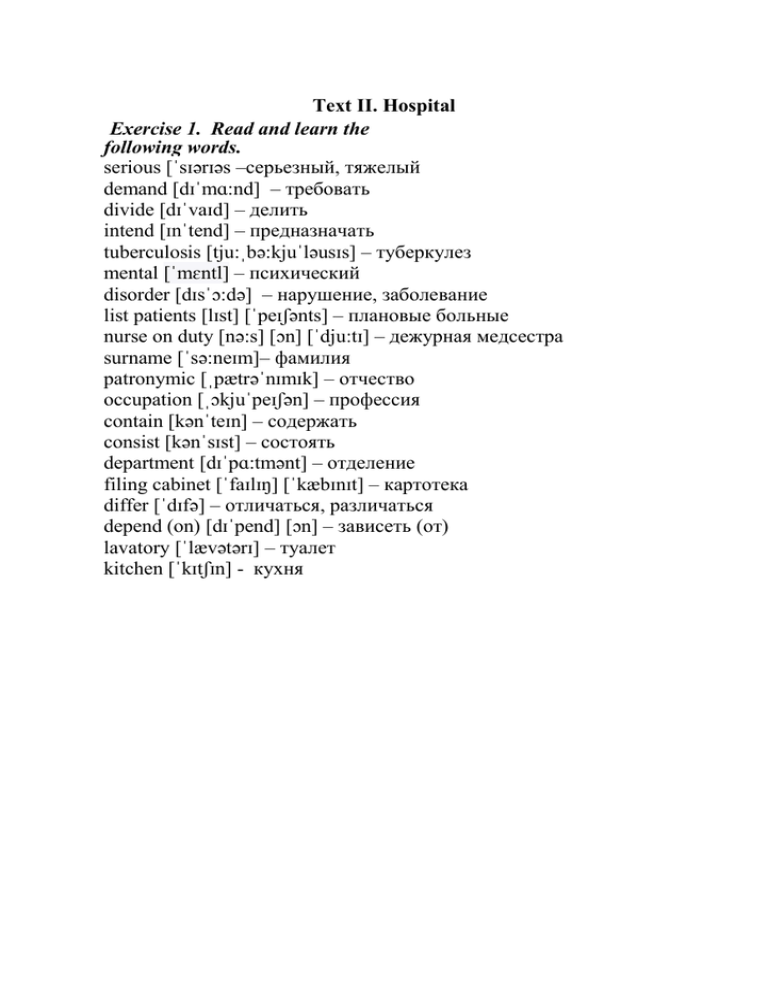
Text II. Hospital Exercise 1. Read and learn the following words. serious [ˈsɪərɪəs –серьезный, тяжелый demand [dɪˈmɑ:nd] – требовать divide [dɪˈvaɪd] – делить intend [ɪnˈtend] – предназначать tuberculosis [tju:ˌbə:kjuˈləusɪs] – туберкулез mental [ˈmɛntl] – психический disorder [dɪsˈɔ:də] – нарушение, заболевание list patients [lɪst] [ˈpeɪʃənts] – плановые больные nurse on duty [nə:s] [ɔn] [ˈdju:tɪ] – дежурная медсестра surname [ˈsə:neɪm]– фамилия patronymic [ˌpætrəˈnɪmɪk] – отчество occupation [ˌɔkjuˈpeɪʃən] – профессия contain [kənˈteɪn] – содержать consist [kənˈsɪst] – состоять department [dɪˈpɑ:tmənt] – отделение filing cabinet [ˈfaɪlɪŋ] [ˈkæbɪnɪt] – картотека differ [ˈdɪfə] – отличаться, различаться depend (on) [dɪˈpend] [ɔn] – зависеть (от) lavatory [ˈlævətərɪ] – туалет kitchen [ˈkɪtʃɪn] - кухня Exercise 2. Read and translate the text. Hospitals Patients whose state is too serious and who demand in-patient caring are hospitalized. There are different types of hospitals, including infectious disease hospitals, therapeutic hospitals, departmental hospitals, oncologic clinics and others. All the hospitals are divided into general and specialized ones. The specialized hospitals are intended for treating patients with tuberculosis, infectious diseases, mental disorders, etc. Usually patients are hospitalized according to doctor's recommendation. Emergency cases are taken to the hospital even without having the doctor's recommendations. List patients are usually admitted to the department or ward depending on their state and diseases. Receiving a patient a nurse on duty has to take his clinic case history, including physical examination and laboratory studies, systematic classification of the common symptoms and signs. When writing a case history, the nurse must make a compilation of the patient's case record (clinical notes), as well as putting down the patient's personal data (name, surname, patronymic, age, social status, occupation, address, etc.). The case history should contain the date of patient's admitting to the hospital and the date of his leaving (discharging), diagnosis and recommendations. A general hospital is usually divided into two parts, consisting of outpatient and in-patient departments. Consulting rooms, waiting rooms, a filing cabinet, where records are kept, and laboratories and X-ray rooms making a part of a hospital are called outpatient departments. The basic unit of the in-patient department is a ward, where patients receive their nursing and medical care. The number of wards differs depending on the size of the hospital, but in general there are several groups of wards including medical, surgical, special surgical, obstetric and gynecologic, pediatric, etc. A ward consists of rooms for patients, a treatment room, nurse's room, bathrooms and lavatories; there may also be an admission room, a kitchen, and a small laboratory. Exercise 3. Answer the following questions. I. What patients are usually hospitalized? 2. What types of hospitals are there in Russia? 3. How are all the hospitals divided? 4. Whom are specialized hospitals intended for? 5. How are usually patients hospitalized? 6. How are emergency cases hospitalized? 7. Into what departments are list patients admitted? 8. What has a nurse on duty to do receiving a patient? 9. What must a nurse write down when filling in a case history? 10. What should a case history contain? 11. What parts does a general hospital usually consist of? 12. What is an outpatient department? 13. What is a basic unit of the in-patient department? 14. What does the number of wards in the hospital depend on? 15. What wards are usually there in the hospital? 16. What rooms does a ward consist of? Exercise 4. Give the Russian equivalences and learn them. outpatient department, list patients, filing cabinet, admission room, specialized hospital, inpatient caring, emergency case, nurse on duty, case history, general hospital, consulting room. Exercise 5. Give the right equivalences. принимать (advise, admit, according), включать (induce, include, involve), различный (even, any, various), содержать (develop, consist, contain), обеспечивать (provide, discharge, demand), состояние (state, stage, study, condition). Exercise 6. Match the words from the left column with the words of the right column using Russian words combinations. история болезни, неотложная помощь, маленький размер, болезненное состояние, различные требования, медицинский уход, длинный список; disease long case small emergency different aid size history state list care medical demand Exercise 7. Make as much as possible word combinations with word various. various diseases treatment study case-history institutions persons patients Exercise 8. Fill in admissions with the corresponding word combinations. 1. The nurse on duty filled in the patient's ... . 2. The patient was seriously ill and needed ... . 3. ... in hospitals must be on a high level. 4. There are ... of patients waiting for specialized medical care. 3. The ... of a person was quite obvious even without examination. 6. This hospital is of ... . 7. Medical care at the hospital must correspond ... . 8. ... are treated by highly qualified specialists in general hospitals. Exercise 9. Match the words from the left column with the word combination of the right column. provide treatment admit to the hospital discharge from the hospital intend for treatment patient’s state patient's data предназначать для лечения состояние больного данные на больного поступать больницу проводить лечение выписывать из больницы Exercise 10. Complete the sentences and translate them. 1. There are 1. the patient’s case history 2. On admission to the hospital the 2. different types of hospitals nurse on duty 3. general and specialized ones 3. The patients are recommended for 4. by a district doctor hospitalization 5. inpatient and outpatient departments 4. Data on patients age, occupation, 6. fills in a case-history social status are included into 7. in any hospital 5. A general hospital has 6. The hospitals are divided into 7. There are many different rooms Exercise 10. Translate the following sentences from Russian into English. 1. Сегодня мой друг попал в больницу. 2. Его принимала дежурная медсестра. 3. Она заполнила его историю болезни и направила к дежурному врачу. 4. Врач осмотрел моего друга. 5. Он спросил о его жалобах и диагнозе. 6. Затем он направил его в хирургическую палату. 7. Палата была большой, в ней было пять коек. 8. Моему другу было рекомендовано хирургическое лечение. Exercise 11. Fill in admissions with the following words. a. ill – sick 1. The nurse mixed the medicine with a teaspoon and gave it to the ... man who sat up in the bed to take it. 2. When people are ... and have a temperature over 39C we say they are in a high fever. 3. When I come to the dissecting room I feel ... . 4. She was suddenly taken ... . b. illness (sickness) – disease 1. Did the man suffer from any chronic ... or complications after a serious ...? 2. Scarlet fever is an infectious ... . 3. His ... prevented him from going to school together with his friends. c. ache – pain – hurt 1. As an old man was coming home a sudden ... in his heart made him stop and take some nitroglycerine. 2. Wet weather often makes old people feel an ... in their bones. 3. He fell down the stairs and ... his leg. 4. This heavy suitcase makes my arm ... . 5. Did you ... yourself? Exercise 12. Translate the following clinical case histories records into Russian, if necessary using the dictionary. Case one A man, aged 44, fell ill. He returned home from his work on the day previous to the onset of his illness and felt a bad headache and chillness. The physician who examined the man in the afternoon found the symptoms of influenza. The man complained of pains in the head, back, eyes, limbs and joints. He had a fever, which ranged from 38,5 to 39,7C. He was hoarse and had a harsh cough. He often sneezed. The mucous membrane of the nose and throat was red. The examination of the urine showed nothing abnormal. The sick man kept his bed for several days and regularly took the medicine. In several days the fever fell to normal. The pains in the limbs and joints disappeared but a marked hoarseness remained for several days. In two weeks the man was well again. Case two. A young man, aged 24, fell ill with the flu. The illness began with a chill, and during five days he had a bad headache. On the sixth day the doctor sent him to the hospital. To the doctor who examined him there he complained of prostration and pains in the limbs and in the right chest. His temperature was 39,2C, pulse 126 and respiratory rate 32 per minute. BP (blood pressure) was 120/70 mm Hg. The doctor diagnosed pneumonia as a complication after the influenza. The urine was normal. Laboratory analysis revealed pneumococci in the sputum. Hemoglobin content was normal. Blood count showed leucocytosis (12,000 leucocytes per cubic millimeter). Blood culture remained sterile. The doctor prescribed sulfa drugs, which the patient took during a week. By the end of the week he felt and looked well. His temperature fell to normal, he slept well and his appetite was good. He did not complain of discomfort and made a complete recovery. Soon he left the hospital and went to the sanatorium. Case three. A man, aged 52, developed a mild upper respiratory infection one week previous to admission. Two days before he had chills, fever, and marked prostration. He coughed but did not complain of chest pain. The man’s temperature was 39,3C, pulse 126 and respiratory rate 36 per minute; BP 140/90 mm Hg. He had bronchial breathing over the right lateral chest. The urine was normal. Hemoglobin content was 85% and leukocyte count 20.000. Laboratory analysis revealed type I pneumococci in the sputum. An X-ray film of the chest showed a large area of density in the right upper field of the lung. The patient received an initial oral dose of 2 g of sulfadiazine, and then 1 g every four hours. The treatment lasted 11 days. On the seventh day of the therapy the patient felt and looked much better. The bronchial breathing disappeared. In twelve days the temperature fell to normal; leukocyte count lowered to 7.200. Pulse was 80 and respiratory rate 20 per minute. Soon the patient made a complete recovery without any complications. Пояснения к уроку Разница между sick и ill Употребление sick: речь идет о самочувствии человека в общих чертах; в качестве определения вместе с существительным; в британском английском употребляется в качестве сказуемого в значении «тошнить»; в американском английском употребляется в качестве сказуемого в значении «болен». Употребление ill: подразумевает более серьезное заболевание; в предложении употребляется в качестве сказуемого. Examples (примеры) She was taking care of the sick child – Она ухаживала за больным ребенком. (речь идет об общем самочувствии; употребляется в качестве определения) I always feel sick in the car – Меня всегда тошнит в машине. (употребляется в качестве сказуемого в значении «тошнить») A number of these patients are terminally ill – Некоторые из этих пациентов неизлечимо больны. (подразумевает более серьезное заболевание; в предложении выполняет роль сказуемого) Remember (запомните) sick leave – больничный to be sick with something – заболеть чем-то to fall ill – заболеть Disease Этим словом обозначают болезнь, заболевание в самом широком смысле. Слово "disease" может означать врожденную или неизлечимую болезнь, патологию, любое отклонение от нормы. "Disease" можно перевести и как «расстройство»: и физическое, и душевное. Этим словом обозначают самые тяжелые болезни и диагнозы, часто становящиеся приговором и длящиеся всю жизнь. Illness Это слово чаще всего используется для обозначения симптомов "disease", плохого самочувствия. Человек может быть болен чем-то (He is diseased.), но при этом не чувствовать себя плохо (He is not ill.); или наоборот — быть больным (He isill.), но не иметь при этом патологии (He hasn’t got any disease.). Плохое самочувствие (illness) не может длиться вечно, от него можно избавиться, а от заболевания (disease) — не всегда. Sickness Это слово тоже обозначает «плохое самочувствие», но не как симптом или проявление внутреннего заболевания (disease), а как неприятие чего-то, реакция на что-то непривычное. Человек может испытать плохое самочувствие (sickness) от перепада температур, резкого запаха, тряски или отравления. Часто встречается выражение "I'm sick of it / It makes me sick" — меня от этого тошнит, воротит, я не приемлю этого — т.е., состояние "sickness" может быть не только физическим, но и моральным. Также словом "sick" обозначают временную недееспособность, когда человек пропускает работу, существует даже специальный термин "sick days" — дни на больничном. Pain, hurt или ache? В английском языке существуют разные слова для обозначения видов боли. Это "pain", "ache" и "hurt" Боль, обозначаемая словом "pain", может возникнуть сама по себе, она длится очень долго, и её можно стерпеть. При переводе на русский мы можем использовать глагол "болеть" или существительное "боль". I've got a pain in the neck - У меня болит шея. The pain in the muscles began last Sunday - боль в мышцах началась в прошлое воскресенье. Глагол "hurt" обозначает причиняемую боль, рану. При переводе на русский язык используется словосочетание "принчиять боль" Don't tell me, 'cause it hurts - Не рассказывай мне, потому что это причиняет мне боль Также существует выражение "to get hurt" — пострадать: Seven people got hurt in a car accident — Семеро людей пострадало сегодня в аварии. Есть ещё слово "ache", которое является практически полным синонимом "pain", но употребляется чаще всего в медицинском смысле. Такая боль обычно сосредоточена в его определённой части: earache, toothache, stomachache.Так же как и для "pain" при переводе используется глагол "болеть" и существительное "боль". I had a toothache, so I went to the dentist.- У меня заболел зуб и я пошел к зубному врачу. Существительное "ache" может также становиться глаголом, а вот "pain" не может, ему для этого потребуется слово "cause" (причинять). При переводе словосочетания cause pain так же, как и в случае с глаголом "hurt"используется словосочетание "причинять боль". My burned hand ached for a week — Моя обожжённая рука болела неделю. This procedure won't cause any pain — Эта процедура не причинит никакой боли.
